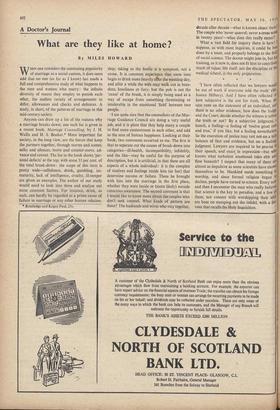A Doctor's Journal
What are they like at home?
By MILES HOWARD WHEN one considers the continuing popularity of marriage as a social custom, it does seem odd that no one (as far as I know) has made a full and comprehensive study of what happens to the men and women who marry : the infinite diversity of means they employ to punish each other, the endless variety of arrangements to differ, allowances and checks and defences. A study, in short, of the patterns of marriage in this mid-century society.
Anyone can draw up a list of the reasons why a marriage breaks down; one such list is given in a recent book, Marriage Counselling, by J. H. Wallis and H. S. Booker.* More important for society, in the long view, are the forces that keep the partners together, through storms and scenes, sulks and silences, move and counter-move, ad- vance and retreat. The list in the book shows `per- sonal defects' at the top, with some 33 per cent. of the total break-down : the scope of this term is pretty wide—selfishness, drink, gambling, im- maturity, lack of intelligence, cruelty, ill-temper are given as examples. The author of our study would need to look into these and analyse out some common factors. For instance, drink, as such, can hardly be regarded as a prime cause of failure in marriage or any other human relation- * Routledge and Kegan Paul, 25s. ship; taking to the bottle is a symptom, not a cause. It is common experience that some men begin to drink more heavily after the wedding day, and after a while the wife may walk out in bore- dom, loneliness or fury; but the pub is not the `cause' of the break, it is simply being used as a way of escape from something threatening or intolerable in the emotional 'field' between two people.
I am quite sure that the counsellors of the Mar- riage Guidance Council are doing a very useful job, and it is plain that they help many a couple to find more contentment in each other, and add to the sum of human happiness. Looking at their book, two comments occurred to me. The first is that to separate out the causes of break-down into categories—ill-health, incompatibility, infidelity, and the like—may be useful for the purpose of description, but it is artificial, in that these are all aspects of a whole individual: it is the complex of motives and feelings inside him (or her) that determine success or failure. These he brought with him into the marriage in the first place, whether they were inside or (more likely) outside conscious awareness. The second comment is that I would like to know more about the couples who don't seek counsel. What kinds of pattern are these? The husbands and wives who stay together, decade after decade—what is known about that? The couple who 'never quarrel; never a cross Wad in twenty years'—what does this really mean? What a vast field for inquiry there is here! I suppose, as with most inquiries, it could be best done by a team, and properly belongs to the field of social science. The doctor might join in, but 1111 training, as it now is, does not fit him to contribute much of value; life itself, not the discipline of the medical school, is the only preparation.
'I have often reflected that we lawyers would be out of work if everyone told the truth' (Mr. Justice Hilbery). And / have often reflected on how subjective is the test for truth. When the case rests on the statement of an individual, and there is no other evidence, how does the Judge, and the Court, decide whether the witness is telling the truth or not? By a subjective judgment, a hunch, a feeling—a feeling of 'twelve good mei and true,' if you like, but a feeling nevertheleSs. So the execution of justice may rest not on a nice balance of fact and evidence, but on a feeling' judgment. Lawyers are required to be precise 10 their speech, and exact in expression—but Who knows what turbulent emotional tides ebb and flow beneath? I suspect that many of them are almost as impulsive as some scientists have shosva themselves to be. Mankind needs something to worship, and since formal religion began le decline, people have turned to science. Every nal and then I encounter the man who really believe that science is the key to paradise, and a few of these, not content with worshipping their idol, are bent on stamping out the infidel, with a fer• your that recalls the Holy Inquisition.












































 Previous page
Previous page